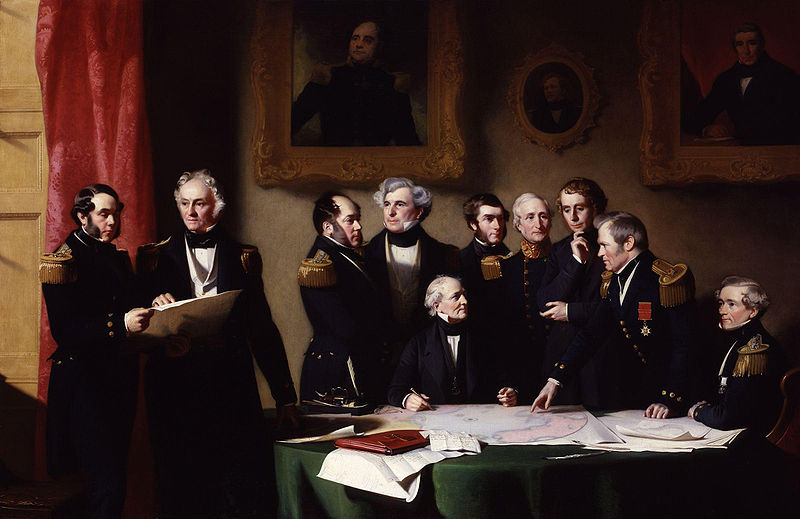A beaming Stephen Harper announced today that one of the two ships from the long-lost Franklin expedition was “discovered” by scientists and researchers on the largest ever expedition to find the missing shipwrecks.
“I am delighted to announce that this year’s Victoria Strait Expedition has solved one of Canada’s greatest mysteries,” Harper said in a statement.
It was a rare show of glee by the now morose, now insolent Harper. The Prime Minister has been under fire lately — besieged by a horrible job market and ridiculed for his toothless bluster on Israel and Russia. Unravelling the mystery of the Franklin Expedition has been described as a “pet project” of the PMO, but he has been unable to find traction in the media until this morning. Critics have rightly asked why Harper is so eager to find what happened to a hundred or so Brits who died 200 years ago when he refuses to entertain the idea of an inquiry into the causes of over 1,000 missing and murdered Indigenous women today. Frustrated by these appeals to the wrong sort of history, Harper had sequestered himself from lens and pen, as per his habit.
But there was Harper, grinning in almost forced rapture — as if the news conference itself was a shiny new Beatles first edition vinyl he had just acquired to add to his collection. It had the redolence of a jaded adolescent who, unable to cajole his classmates into trading hockey cards with him, just went and bought the whole set off eBay.
The tableau, of course, is cut with irony. First, there is the matter that Harper’s Conservatives have been relentless with their cuts to Parks Canada (who led the Victoria Strait Expedition), who have lost nearly 1,700 jobs since 2008, and to Libraries and Archives Canada, who have seen entire collections mothballed and access to archives cut. Of course, Harper would surely answer the criticism that his administration isn’t actually overly concerned with history with a gesture toward the pomp he delivered during the bicentenary of the War of 1812…
Second, is the awkward timing of the Franklin expedition and his refusal to address the epidemic of murdered and missing Indigenous women. His infamous “sociological phenomenon” vs “crime” gaffe was bad enough, but what’s notable about today’s press conference is that it was really an announcement that nothing was “discovered” at all.
“The Inuit have said for generations that one of their hunters saw a ship in that part of the passage, abandoned and ended up wrecking,” said the CBC’s Peter Mansbridge. “It’s exactly where this guy said it was.”
It took almost two hundred years for Canadians to decide to listen to Inuit people who actually saw the ship crash. And when they did listen, they called it a “discovery.” It’s almost as if Mansbridge wants to credit the scientists for coming up with the idea to stop ignoring Aboriginal peoples. Today’s announcement both diminishes the Inuit oral history directly responsible for finding the wreckage while simultaneously seeming to validate it. Good job, traditional peoples. Let the grown-ups take it from here.
Métis/Cree poet Marilyn Dumont writes on her Facebook page:
“My question is, if the Inuit stories recount the location of the Franklin ship and ‘researchers discovered’ this material evidence through the Inuit Traditional Knowledge, why aren’t the Inuit perceived as practitioners of formal systems of knowledge? Why aren’t the Inuit ascribed ‘discoverers?'”
It’s a thick knot: dead colonial explorers attempting to discover land already discovered by the Inuit are “discovered” by present-day explorers using methods already discovered by the Inuit. And throughout it all, land claims, title, knowledge systems, authority and presence are systematically denied and extinguished.
You’d be tempted to call this systematic, centuries-old erasure a sociological phenomenon — one that is repeated and re-inscribed on all our social structures: a justice system that is deaf to Aboriginal stories, an electoral system that disenfranchises Aboriginal voices, an educational system that ignores or denigrates Aboriginal knowledge and meaning making. A sociological iceberg so large that we can’t even strike our boats against it because we’re already inside.
We could call it a sociological phenomenon — but I’ll just call it a crime.




